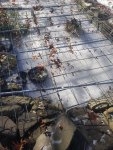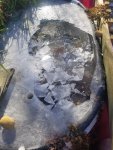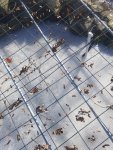The water doesn't have to be moving for the fish to survive. Water, when it hits 38 F, gets more dense so it sinks. That's why ponds don't freeze bottom up. The fish will be at the bottom. Depending on your frost line in NJ, the surrounding earth will keep your pond bottom layer of water above freezing and the fish will be okay. Keeping a hole open allows any toxic gas buildup from forming as the decay process and slowed metabolic process of your fish doesn't stop. It has nothing to do with oxygen addition. Cold water holds far more O2 than warm. Fish kills happen when the ice stays for such a time that the decaying process (which consumes O2) robs the pond of enough O2. Contrary to what most want to believe, an aerator puts minimal O2 into the pond (as it travels up through the water stream) but instead, does it's job by agitating the surface. It is there the O2 process is taking place.
And as noted, in the winter, this is not the reason for an aerato--it's just to keep a hole open. And that said, fish can survive a long time being under the ice. Tipping points occur when the fish load is too much for the water volume/surface area of the pond. As long as your water depth is lower than your state's frost line, the fish should be okay. You don't want the ice to freeze solid. Above ground ponds are more susceptible because of greater exposure to sub freezing temps. In ground takes advantage of the earth's natural heat (typically around 50 F). When the snow cover is on the ice for a long time (and hence the ice cover beneath that), the existing algae struggles with a lack of light. But, the snow cover also helps insulate and slow the progress of ice thickness.
A pond heater helps in that it can handle up to 15" of snowfall and has a heater built into it for helping a very small pump keep a hole open all winer long. Google it (also, there's threads here to help) and check it out. Probably too late for the moment but you could put one in the first chance you get (when the weather breaks enough so you can melt a hole in the ice either with a cattle trough heater or the boiling water trick; as noted by jw; don't pound/chip/strike the ice as the shock waves can kill your fish).
I know of a pond near me that is only 18" deep (preformed in the ground) and his fish survive the winters. Still, I'd have a pond be at least 24" and 3' is a lot better. My own pond is 44"-48". I have no water moving and use a pond heater now, after initially using an aerator to keep a hole open.
Hope this helps.
Michael






